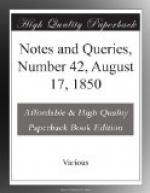The shield with the “sight” is very curious; it weighs thirty pounds, and is of the temp. of Henry VIII.
It is impossible to describe the horror of the old lady at our doubting her version; she seemed to wonder the earth did not open and swallow us for our heresy.
NASO.
“Welcome the coming, speed the
parting Guest”
(Vol. ii., p. 134.).—
“Welcome the coming, speed the parting guest,”
is from Pope (Imitations of Horace, book ii. sat. ii.).
Pope’s distich, whence the line is taken, runs,—
“For I, who hold sage Homer’s
rule the best,
Welcome the coming, speed the going
guest.”
Query. Where is “sage Homer’s rule” to be found?
RUSTICUS.
[The following additional reply furnishes a solution of the Query of RUSTICUS:—
“True friendship’s laws are
by this rule express’d,
Welcome the coming, speed the parting
guest.”
These lines are from Pope’s Homer, the Odyssey, Book xv., lines 83 and 84.
E.H.]
“A Chrysostom to smoothe his Band in” (Vol. ii., p. 126.).—This Query by Rev. ALFRED GATTY is answered by referring him to the Happy Life of a Country Parson, by Swift, beginning with—
“Parson, these things in thy possessing,
Are worthy of a bishop’s blessing.”
And enumerating amongst them
“A large Concordance bound long
since,
Sermons to Charles the First when prince,
A chronicle of ancient standing,
A chrysostom to smoothe thy band in;
The polyglott—three parts—my
text,
Howbeit—likewise—to
my next.”
T.H.Q.
[C.I.R. (to whom we are indebted for a similar reference) adds the concluding line—
“And shake his head at Doctor Swift.”
which would show that the verses were written not earlier than 1701, as Swift, the author, took his D.D. degree in that year.]
William of Wykeham (Vol. ii., p. 89.).—
“Historica descriptio compleetens vitam ac res gestas beatissimi viri Guilmi Wicanii quondam Vintoniensis episcopi et Angliae Cancellarii et fundatoris duorum collegiorum Oxoniae et Vintoniae.”
is the title of a biography of William of Wykeham attributed to Thomas Martin, published in 4to. Oxford, 1597.
There is also a little work which may come under the head of biographies, viz.:
“Uvedale (Robert) Examination
of Lowth’s objections to the
account given by Leland of
the parentage of William of Wykeham,”
8vo. 1801.
Vide Oettinger’s Bibliographie Biographique.
S.W.
Dutch Language (Vol. ii., p. 77.).—H.B.C. recommends, among other works, Hendrik Conscience’s novels. These are in Flemish, not Dutch. The difference may not be great between the two; but one would hardly recommend to a learner of English, Burns’s Poems as a reading-book. In 1829 Dr. Bowring wrote an article, being a sketch of Dutch literature, in the Foreign Quarterly Review; which article was reprinted in Amsterdam in the form of an 18mo. volume, and which I believe is still to be got, and is a very useful guide to Dutch literature.




